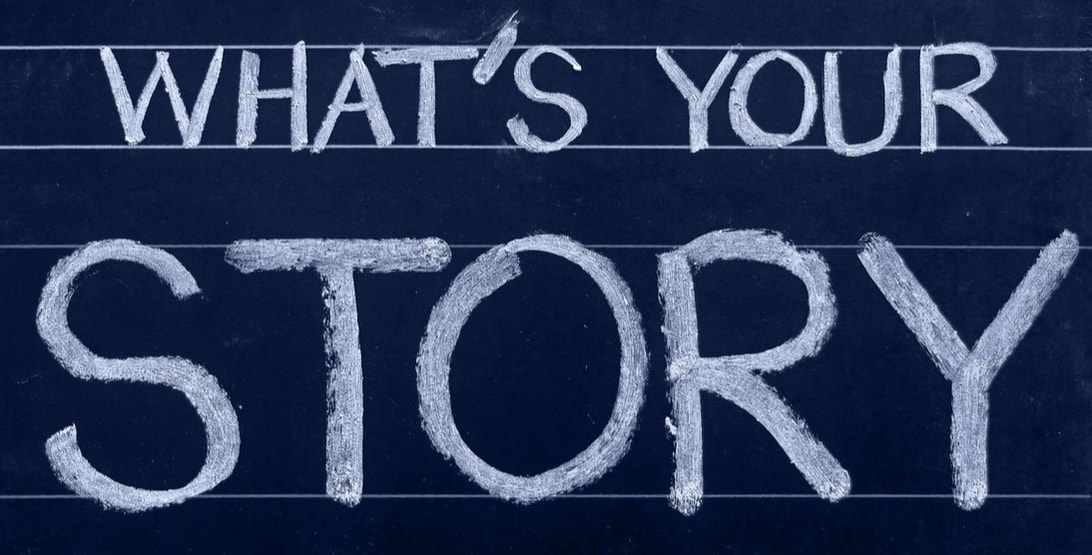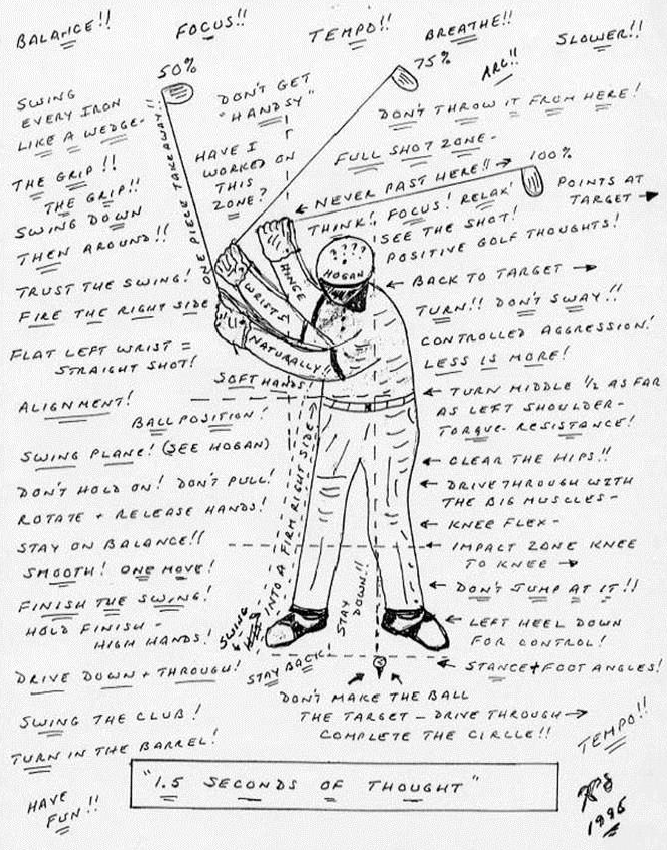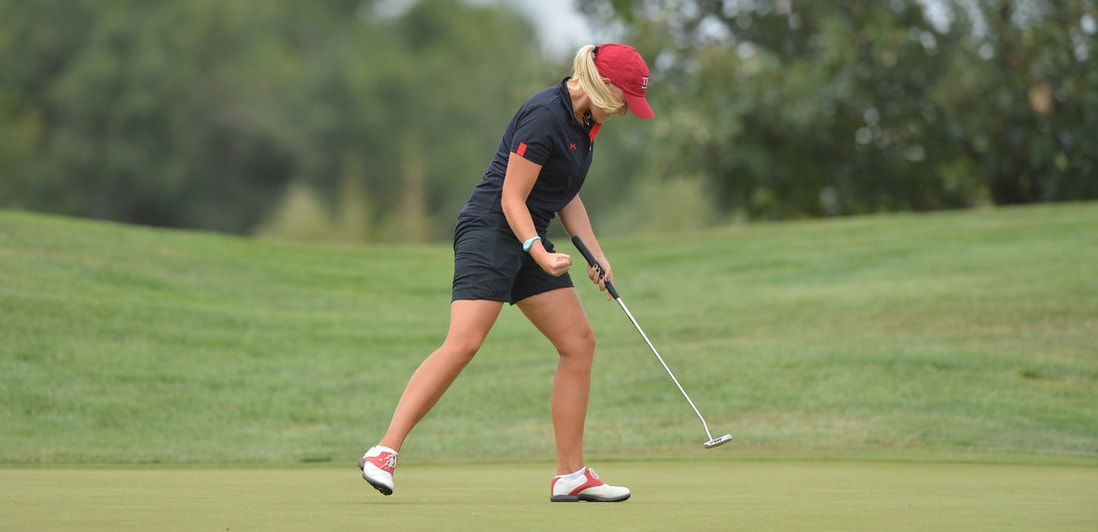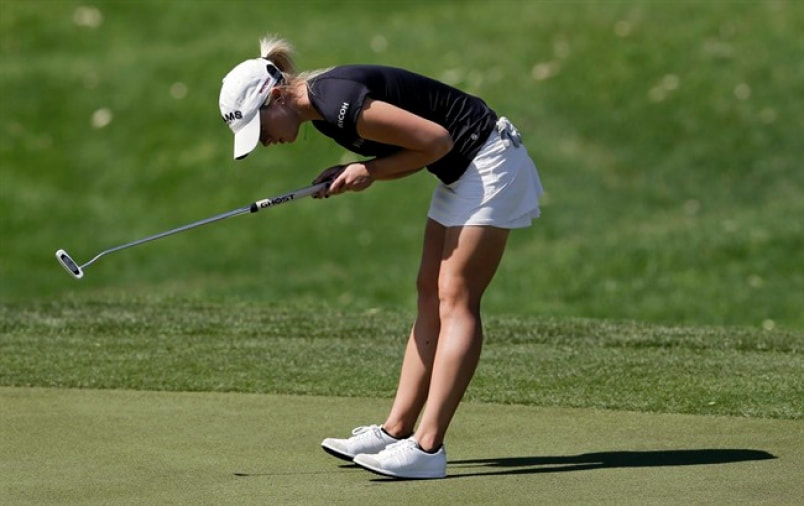|
Yes coach its been six weeks. And the good news is that I’ve been playing a lot better thanks to you.” “I’m sorry Sally, but I can’t take the credit for your good play, it was all because of you.” “Well, I’ll agree to disagree with you on that one coach. Suffice to say I’m surprised because it’s the best I’ve played for a long time. I made the cut in my last four tournaments, and I finished in the top 10 twice.” “You shouldn’t be surprised that you can play like that Sally because you have played well and won in the past, so why not again?” “I don’t know coach, I guess I was surprised because with all the struggle, I’ve been used to people prodding and critiquing my swing—especially when I didn’t play good. It’s what I got used to. “Sure Sally, you had become very good at telling a particular story to yourself, and anyone else who would listen about a golfer named Sally who has struggled for a long time with her game. So how was that going for you?...” “Well, not good.” “That’s right, you got really good at learning how to not play very well. You also got good at learning how to sabotage any success that potentially could happen to you Sally. Now, you can practice telling yourself a different story—one with a better outcome.” “Hmmm, that’s really very interesting. So are you saying my story is the main problem.” “Well, yes, I’m saying that it is the only problem. The story or narrative is always the problem—but it is also the solution. Now do you remember what we discussed in our last lesson?” “Yes, of course coach, how could I forget! Just let me get my notebook out of my golf bag because I wrote lots of notes after our last lesson... You know coach you really do know how to make a first impression haha.” “Yes I’ve been accused of that many times Sally.” “I mean, I was getting very emotional and teary eyed when I described to you how badly I was playing. But you just sat there and said nothing. So I started to get upset and angry with you and was on the verge of getting up and telling you to shove your lesson where the sun doesn’t shine!" "And you just continued to sit there with no visible emotion, and no sympathy for me. You just agreed with everything I said. All I was doing was expressing how I felt about myself and that I felt like giving up to go and do something else." "And that’s when you said something that stopped me in my tracks...You said ‘yes Sally, you should probably give up...’ and after a long pause, you completed your sentence with... “behaving that way.” “Sally, as a professional athlete, you are so used to people on tour agreeing with you and your stories, and everyone is especially careful to not hurt your feelings. And they all want to help you. I simply made a decision to not be another ‘yes man’ in your life.” “Coach, to be honest I was truly shocked, and to make matters worse, you went on to say that I should be congratulated for doing such an excellent job of learning how to reinforce self-limiting beliefs and insecurities with the help of the golf swing instructors I contracted who you described as ‘enablers’—who temporarily satisfy my ‘addiction’ as you called it." "Now, after a lot of reflection, I can see that you are right. You know coach, I know many golfers on tour who are like me, golf swing addicts, and the worse thing is they don’t know it." "You said that I had learned to link playing well to swinging well, and when I hit poor shots enough times, I eventually became addicted to ‘fixing’ my imperfect swing. But as you explained, my poor play had nothing to do with an imperfect golf swing, my poor play was merely a reflection of a weakening self-image in the context of performing on the golf course in tournaments.” “That’s right Sally, and here’s the thing to remember. You were one of a few players good enough to get onto a tour, and you were also good enough to win when you got there. Now most golfers are not good enough to get onto a tour, and even if they do, most don’t win—or stay on tour." "You checked both of those boxes off, which makes you a pretty clever human being. You see Sally you changed the narrative of your story from being a successful golfer on a professional golf tour to a story about a struggling and disappointed golfer thinking of giving up." "You were slowly-but-surely learning helplessness through your consistent failure to hit shots to your expectations, and without realising it, this was leading you to believe that you were ‘broken’ and in need of constant repair. You and your golf swing became one problem.” “Actually coach, this is the first time anyone has explained to me an alternative view on what ‘fixing’ or ‘fix’ means in golf. You say that it describes elite golfers who behave like addicts, who need to ‘get a fix’ to temporarily take them out of their depression from playing poorly.” “Right Sally, golfers with this type of addiction often require consistent amounts of ‘golf swing fix’ to feel better about themselves, and as I said, golf swing instructors are the enablers who must satisfy the golfers compulsion for repetitive—rule-bound, or ritualistic behaviour." "Golf swing technique lessons satisfy this repetitive — rule bound criteria in most cases. These golfers feel they must have their swing mechanics perfect to feel good about themselves, and they do this so they can manage the stressful situations they encounter — especially when they perceive that they are not playing close enough to their expectations.” “Yes exactly! That was me! And the key takeaway from the last lesson was that it takes just as much energy to think about what I don’t want from my game as it does to think about what I do want." "You said that I should focus my energy on being highly specific about what I want from my golf, and that I need to get back to employing learning and behaviour strategies that allow me to play the way I played when I was really competitive.” “And Sally, those strategies are just better stories aren’t they.” “Well yes, I guess so. And those improved stories have been working really well for me coach. "Response-ability"“Now I’d like to share with you another useful strategy. This strategy is called the strategy of response-ability. It is the action of taking responsibility for accessing the right thoughts, feelings and behaviour at the right time. "This strategy helps you to understand that you are the sole creator of your circumstances on the golf course, and never a victim of them. You can’t control the bounce of the ball, but you can control how you behave as you move into the ball, and you can control how you behave after executing a stroke, every— single—time." "Response-ability means that your success in golf is completely up to you, and no one else. Sally you are capable of getting what you want from your game, but you must heighten your awareness which had been dulled from your need to ‘fix.’" "So, now when you have the urge to self-sabotage, you take charge, otherwise you will move towards the things you don’t want from your game.” “So coach I have been having a lot of success since last lesson by choosing shots I wish to play, and playing them without letting distractive thoughts take my stroke hostage. Your advice was that anytime I think and feel uncertain about a stroke I’m going to make, I simply say to myself out loud, “I can play this shot now,” and then I walk into the shot as if if there’s no possible way that it can fail to come off.” “Great work Sally, that is what response-ability is all about. You are in charge of what happens. If you don’t like what you get, no big deal needs to be made about it. If, on the other hand you like what you get, acknowledge it. You see Sally intentionality works at either end of the spectrum?” “What do you mean at either end of the spectrum coach?” “Well Sally, if you want struggle in golf, you simply ask for it and focus on it and you will receive it. Alternatively, if you want success—whatever you decide that means, you just ask for it and focus your intention on getting it. You see Sally, it not that hard to understand, but it is essential that you know how intentionality works. Remember, ask and ye shall receive?” “Yes coach I get it. But I was told so often that I was playing badly because I was a victim of negative thinking?” “Maybe someone else’s negative thinking haha. No, I don’t think that’s entirely true Sally, it’s more like you just invested your energy in thinking strategies that set up outcomes that you didn’t want.” “Oh, I see, that actually makes a lot of sense coach, but I’ve never heard it said quite like that. It seems too simple.” “Right, and that’s why most elite amateur and professional golfers will stay addicted to swing fixing, because sometimes the answer seems so simple as to be not good enough for them." But not you Sally, you are taking the reins of your game, and also your life." “Now Sally, let’s get back to my story — the one I shared with you at the beginning of our lesson. What do you think the meaning of the story is? Do you remember it?” “Sure, you mean the woman riding the horse?” “Yup, that’s the one.” “Gosh, the meaning behind it... honestly, I’m not too sure.” “Let me share the meaning behind it. You see Sally, she wasn’t riding the horse, the horse was riding her. She was not taking response-ability, she was a slave to the horses will or dominance." "She had no control of where the horse was going. She just hung on and hoped that the horse might take her to where she wished to go. The horse in this story symbolises the unconscious habits that guide us towards things we don’t want, on and off the golf course. And because of these unconscious habits, we end up where we don’t want to go, without even realising it." "When we employ response-ability, we are making a conscious decision to change who leads and who follows, which stops us from mindlessly running around in circles, and ending up back where we started, over and over again. That’s what ‘managing the dominant one’ means Sally.” “Oh, I see.” “For you to get what you want from your game Sally, you employ the strategy of response-ability on a moment-by-moment basis, by developing the ability to be mindful. So rather than becoming an emotional hostage to your game, you employ a creative process that we all possess." "Sally, nothing changes if nothing changes, and by being mindful or aware, you notice and then manage the normal feelings of uncertainty that move through you—feelings that we all have, and you give them a better direction to go." "By doing this you create confidence and momentum in your game, which will guide you and your game to where you wish it to go. And it is a wish Sally, you need to understand that, because no one can predict with any degree of certainty what will happen with the next golf shot—let alone, the whole round." "Wishing is a form of meditation similar to prayer, that when applied consistently, opens the door of opportunity, and when you open this door, you will be rewarded with feelings of peace and calm as you play." "You develop a strong sense that you can manage the uncertainty and randomness of the game by allowing unpredictable events to happen without you reacting negatively to them.”
“I think I see what you are saying coach. By simply accepting unpredictable events as part of the game, when I play it will always be around me, and even if I am affected by it, I don’t allow it to make me think that I have made a mistake that needs ‘fixing’ right?” “Yes that’s right. The trouble with most golfers in my experience Sally is that they don’t like or want what they call bad luck. But it isn’t bad luck, it is randomness, and it exists everywhere, all-the-time. It will happen, and it is always a surprise. We don’t deal very well with those types of surprises do we?” “No we don’t coach, honestly, I don’t think there’s anything worse. But now I know I can deal with it by accepting it and just getting on with my game. There is nothing wrong with me and my game anymore. I just have to wish for what I want—which is my intentionality, and then go out of my way to do it to the best of my ability.” “Ok Sally, do you want to hit some shots for me?” “No coach, thanks, but I don’t think it’s necessary, my game is in fine shape. I think I’ll just go out and play a few holes.” “Great Sally, see you next trip then?” “You definitely will coach.” “Mark, how about we discuss those questions you have for me.” “Ok grandpa, sounds like a good idea.” Comments are closed.
|
Archives
June 2019
|
Proudly Supported By
Copyright © 2011 - 2018 Pro Tour Golf College
Website Managed By Golf Performance Media
All Rights Reserved
Website Managed By Golf Performance Media
All Rights Reserved






 RSS Feed
RSS Feed



